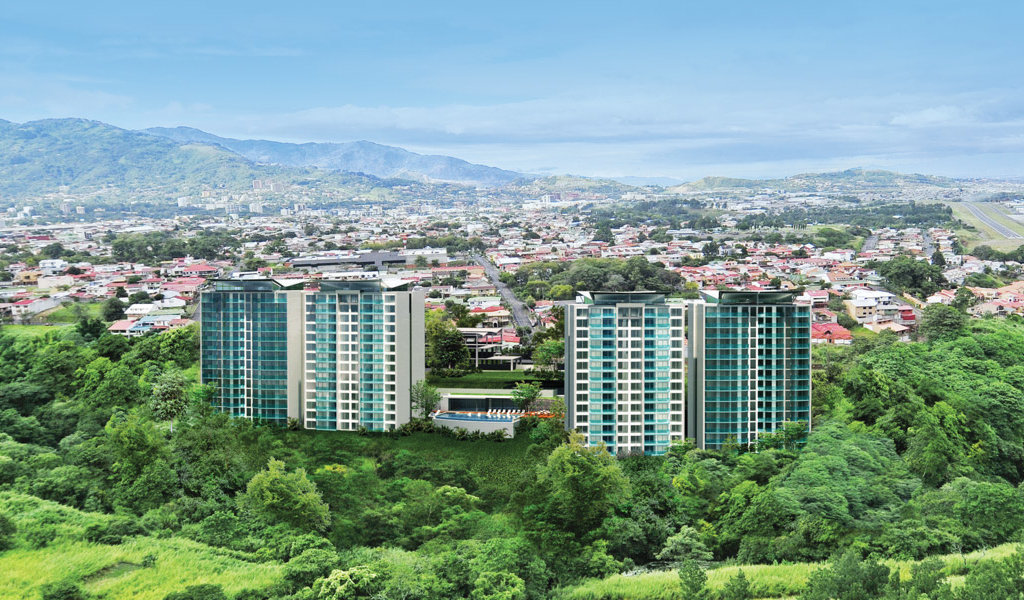COMMENTS
1. Passenger Train: This is needed but it will be a long time coming with substantial cost over runs, and filled with bribery and corruption. And all financed by CR's addition to debt... The current train system is abysmal, looses money, hits cars on a regular weekly basis, it out of service due to lack of maintenance, and the tracks are so crooked that the train cannot go faster than about 20 mi. an hour with jumping the tracks.
2. Judiciary has the country by the genitals... three examples: They enforce the law and look after themselves... first and foremost...
3. Economic Revival: Notice that unemployment is ow 11+%--that is the official rate... Notice also is the admission that the electricity rates are too high... they couldn't figure that out when Intel told them so and tried to negotiate the rate down... INTEL left... the government never thought they would because they had a large investment here... large for CR but not large for INTEL... and with the new tax and reporting regime, it has driven many companies out of business or underground and I am sure the unemployment rate is now higher than that given in the article.
4. Fuel Prices: CR is already the most expensive gas / diesel in Central America.
5. Maritime Problems: Yeah, this could cause a lot of problems for some people.
1. CABEI Gives Costa Rica Loan to Build Fast Passenger Train
The Central American Bank for Economic Integration (CABEI) granted Costa Rica a loan of $550 million to support the construction, equipment and start of operations of the Fast Passenger Train for the Great Metropolitan Area.
The total cost of the project is estimated on $1,297 million, the balance would come from private companies through public-private alliance, the government will carry out an international bidding to pick the best concessionaire. The goal is to have the first stage of the fast passenger train awarded and in process before the end of Alvarado’s Government.
Claudia Dobles, First Lady of Costa Rica, is leading this project, the Fast Passenger Train would cover 73 kilometers of 15 counties of the provinces of San Jose, Heredia, Alajuela and Cartago, with 42 stations that will also allow users to connect with other modalities of transportation such as buses and bicycles, benefiting an approximate 4.5 million people.
CABEI granted the loan with a term of 25 years, 5 years grace-period and an interest rate that will not exceed 1.55% annually, CABEI is also working on the possibility of extending the term of the loan to up to 40 years.
“The Electric Passenger Train in the Greater Metropolitan Area is a transformative project that will change the lives of thousands of people in Costa Rica, providing benefits in terms of transportation times, reduction of costs to people and the country, improvements in health and air quality and a reduction in the country’s carbon emissions in order to decarbonize the economy. In addition, the project is a milestone that lets us dream about other initiatives, such as a Central American Train. It is one of the best investments that the country can make and we are pleased that the Central American Bank for Economic Integration is a key part of this significant project”, commented President Carlos Alvarado.
Dr. Dante Mossi, CABEI Executive President, commented that, “This project marks the beginning of environmentally-friendly railway projects in the region since it is being carried out in a country where most of the Electric power is renewable. Likewise, it will serve as a benchmark for the other similar regional projects.”
2. Legislator responds to President of the Court and makes three complaints about the Judiciary
Pedro Muñoz, from the Social Christian Unity Party (PUSC), responded on Wednesday to the president of the Supreme Court of Justice, Fernando Cruz, and pointed out three complaints.
In an intervention in the Legislative Plenary, Muñoz mentioned alleged abuses of the magistrates of the Judiciary to benefit the Citizen Action Party (PAC) and accused Cruz of rewarding a judicial officer who did not deserve it.
Cruz asked Muñoz on Tuesday to criminally denounce a series of irregularities that the legislator has expressed in the media. However, the Social Christian preferred to make complaints in his space of political control in the Legislative Plenary.
The first refers to an agreement of the Court, dated August 11th, 2008, through which a salary plus or “managerial index” was approved for 46 of the highest positions of the Judiciary.
That incentive, he said, represented increases of 35% of the base salary for all magistrates (including those who approved the agreement) and more than 50% for other positions in the institution.
He indicated that in another agreement, of November 8, 2010, that bonus was added to the base salary of the same 46 positions, with the consequent budgetary impact, because in the Judiciary the salary components are quantified as percentages of the base salary. This led to the increase in bonuses, school salaries, severance and retirement of those who occupy the 46 positions.
He noted that on April 21st, 2017, 2 labor judges filed an unconstitutionality action against the 2 full Court agreements before the Fourth Chamber.
This situation is an incomprehensible absolute perversity within a rule of law,” he said.
The second complaint made by Muñoz refers to the judicial sentence that condemned the former PAC messenger, Minor Sterling, and Manuel Antonio Bolaños, for defrauding the State through 263 special service contracts questioned to finance the electoral campaign of 2010.
But, according to his intervention, the top of the party was left off the hook, as stated by Gerardo Amadeo, Herbert Herra and Jeannete Román.
The third complaint he made was that on September 26th, Fernando Cruz used his double vote to approve the retirement of Berenice Smith, questioned in the case of the cementazo.
He said that in the Judiciary “there is a culture of inbreeding ” that comes from the Political Constitution and that has turned magistrates into life officials. In addition, he said that the institution is a disaster and that this is reflected in reports from the State of the Nation.
3. The areas in which the government must work to revive the economy
Last June the government relaunched its economic recovery strategy with the intention of generating economic growth and reducing unemployment, which already reaches 11.9% according to data from the National Institute of Statistics and Census (INEC). Some of the measures taken include the reduction to 12% of the legal minimum reserve; the Central Bank also lowered the Monetary Policy Rate to one of the lowest levels of recent years, so that the active rates for credits go down gradually.
In addition, they announced the creation of the National Employment Agency, which would start operating in 2020. In addition, they announced the simplification of procedures by the National Technical Secretariat (Setena) for projects with low environmental impact to complete processes digitally, more expeditiously than previously.
Recently, an important reduction of more than 10% in the electricity rates of the subscribers of the Costa Rican Electricity Institute (ICE) was announced. Initially, it was presented as a reactivation measure, but it was not true, since the rebate corresponded to a temporary issue.
And finally, so far, the government proposed salvage loans, a project in which state banks provide credit options to highly indebted Costa Ricans. However, analysts believe that with this proposal the country is still far from reactivation and this only reflects the populism of the Alvarado administration.
Have they been enough? Legislators, business sectors, economists and analysts say no. German Morales, Managing Partner of Grant Thornton mentioned the four areas in which the government has to emphasize its actions to achieve an improvement in the economy of the country.
1- The level of unemployment:
It’s the most drastic problem we have as a country,” Morales said. According to him, the route in this area should be to streamline credit processes for new small businesses, as well as knowing how to provide good support for them to remain stable. He also clarified that encouraging the construction of public works is important because it generates jobs for people with both high and low schooling, in addition to adding value to the country.
2- The increase in public services:
The cost of services such as electricity makes the country unattractive to investors, since the bill is very high. An example of this are the 254 people in Cartago who lost their jobs after the Vicesa company decided to move one of the furnaces to Guatemala, because in the country the cost of electricity is 46% more expensive than in Guatemala. In this line, the expert mentioned that options should be sought to create clean energy with lower costs, as well as reduce the price of fuels.
3- The level of consumption:
People are actually buying less due to financial uncertainty, however, measures such as salvage credits are not sufficient or efficient, because they ultimately create more debt, Morales explained. He added that projects such as giving people their pension savings fund is not convenient, as the economy may be reactivated for a few months, but it would be somewhat spontaneous, when that money runs out, the economy would fall again; citizens would run out of money and won’t have savings.
4- Compliance with the Tax Reform:
Morales said it is essential to comply with the recently approved Law on Strengthening Public Finance, without exceptions.
I count on the fact that a minister (from the Treasury) will come to take the necessary measures, in the line of Mrs. Rocío Aguilar, who will pretend to follow the pending task,” he concluded.
crhoy.com
4. Fuel prices to rise from this Tuesday
Starting on November 5th, the fuels distributed by the Costa Rican Petroleum Refinery (RECOPE) will be more expensive. The request for an increase was raised by the entity in early October and approved by the Public Services Regulatory Authority (ARESEP).
This Monday the tariff modification was made official through a publication in La Gaceta.
The final consumer will go from paying â‚¡616 per liter of Super gasoline to paying â‚¡634, due to an increase of â‚¡17. The liter of Plus 91 gasoline will go from â‚¡597 to â‚¡616, and the liter of Diesel 50 p will increase from â‚¡533 to â‚¡551.
The study updates some of the values in the price equation, including international fuel prices and the exchange rate.
crhoy.com
5. New Law in Costa Rica Could Cause Problems for Beach Front Property Owners
In a previous article we wrote about a new regulation that took effect during September 2019. Basically, every type of corporation in Costa Rica is enforced to disclose who are the stockholders to Central Bank of Costa Rica. This will take place between September 2019 and January 2020, depending on the last ID number on the “cedula juridica”. If the owner of the stock on a corporation are other corporations, the owners of those other corporations must be identified until they reach final individuals.
One main question that arises with said regulation is: How will this impact the properties located on beach areas ruled by the Law on Maritime Terrestrial Zone?. Maritime Terrestrial Zone is defined as all the beach front properties in the country with a “concession” or “lease contract” granted to a corporation. The difference between concession or lease depends if the local municipality has an approved regulator plan or not. If the local Municipality has a regulator plan concession can be granted. If not, a lease applies.
The Maritime Zone consists of a strip of two hundred meters wide measured from the high tide line as well as the islands, islets and sea cliffs. This zone in turn is divided into: A) Public Zone, consisting of a strip fifty meters wide from the high tide line, and B) Restricted Area, consisting on the remaining one hundred fifty meters after the Public Zone. This would become the area which belongs to the Government but can be given in concession to private parties. Most hotels located beachfront operate in this area within the law.
The above-mentioned law establishes that Concessions cannot be granted to corporations where foreigners own more than 50% of the capital stock. This means, supposedly on every single concession or lease on a beach front property granted to a corporation, a Costa Rican owns at least 50% of the stock. For decades, there has been different ways to “play” with this restriction using different and creative paths designed by lawyers and other advisors in order to skip the problem and solve the situation.
Most popular structures in Costa Rica are the Sociedad Anonima or SA, and the Limitada or Limited Liability Corporation. Both have a set of legal books where the two most important are called Asamblea de Socios or Stockholders Minutes, and Registro de Socios or Stockholders Records. On this last one is where all of the current stockholders are recorded. Also, on such a book is where you will usually see any transfer of stock which has been recorded. Being a private record book always granted a chance to play with the regulations.
One of the usual practices was to create an entry according to which 50% of the capital stock was transferred to a Costa Rican, in order to produce a certification to be presented to the Concessions Department of the local Municipality to meet the requirement. And almost immediately, said capital stock was ceded back, so that in reality 100% is owned by a foreign person or company. Another method used is to transfer in trust 50% of the share capital to a Costa Rican or legal firm in the country.
Returning to the underlying issue: What will these corporations do now when informing who their shareholders are? Although the information sent to the Central Bank will not be accessible to the public, it will be accessible to the Tax, Judicial and Public Security authorities that work in the prevention of tax fraud, money laundering and drug trafficking. What will happen if a Costa Rican without reported income or with low income appears as owner of shares in a corporation that owns a hotel or house on the beach with a concession?
It seems that some corporations will face the dilemma: make a correct report informing that the capital stock belongs to foreigners, or make a report based on “the books” showing some Costa Rican as owner of 50% when the reality is different. In both cases there may be severe consequences: losing the Concession / Lease or face future investigations by the authorities. Although at the begining the Municipalities will not have access to the information sent to the Central Bank, it is not known if this may change in the future.
Following the line of thinking of “doing the right thing”, in an eventual future case in which some Municipality intends to cancel the Concession / Lease of a company that owns a property located beachfront because its capital stock belongs exclusively to foreigners, it is a possibility presenting an action before the Constitutional Court challenging article 47 of the Maritime Terrestrial Zone, for which there is already a precedent that can be very important and useful.
In the 90s the “beeper” service was as important and popular as the cell phone is today. This service could only be provided with a Concession from the Government, which could only be granted to Costa Rican citizens or to corporations in which at least 65% of the shares were owned by Costa Ricans. All in accordance with article 3 of Law 1758 as well as article 7 of Presidential Decree number 63. In 1998, a Costa Rican filed a constitutional action against those restrictions, and succeeded.
The Costa Rican person was 65% owner of the capital stock on a corporation that held a Concession to provide pager services. A Mexican corporation was the owner of the remaining 35%. Said corporation offered to buy the 65% to the tico person in order to acquire full control. However, the Authorities in charge will not approve such stock transfer based on the current regulations. As mentioned, those regulations were challenged through a Constitutional Case named Accion de Inconstitucionalidad.
On June 1, 1999, the Constitutional Court accepted the action and granted the right to an opinion to the Government Attorney. His response was that Wireless Services belonged exclusively to the State by provision of the Constitution. It was also claimed that the rationale for this restriction was an aspect of national security and that such services in general served as tools for the formation of public opinion, so there was a public interest in avoiding undue influence of foreign groups in those services.
On August 29, 2001, the Court issued Decree #2001- 3060, granting the Rights claimed by Plaintiff, annulling the restrictions that prevented foreigners from having all the shares in a corporation that owned a Wireless Services Concession. The reasons given were the following:
- The Constitution establishes a principle of Equality before the law, being prohibited from discriminating without being based on a Supreme General Interest that merits it.
- The Constitution also guarantees the Freedom of Business. Any act that excessively limits or precludes the exercise of business activity through unreasonable barriers is contrary to that principle.
- There are certain cases in which it is valid to restrict the participation of foreigners, for reasons of National Security or Major Public Interest. As being elected in certain political positions, have restrictions and controls on how to enter and leave the country, or in labor matters.
- The fact that a corporation controlled by foreigners can have a Concession to provide Wireless Services does not mean that the State has lost control of those services, being able at any time and for well-founded reasons to revoke the Concession granted. Therefore, the restriction imposed has no reason to exist.
In my personal opinion what is currently happening with the Concessions located on the beach seems exactly the same as with the described background. A Concession located in the Maritime Terrestrial Zone consists of a right to use and exploit an asset that continues belonging to the State, which could at any time – after fair compensation and for justified reasons – revoke the Concession and exercise its control over any beach area. Therefore, the existence of such restriction seems discriminatory and contrary to the Constitution.
About the Author: Allan Garro was incorporated as a lawyer and public notary in 1996. He specializes in Litigation, Corporate, and Real Estate Law. He has also acted as an external legal consultant to Congress. He has been the author of more than 100 published English Language articles and can be reached at allan@garrolaw.com










